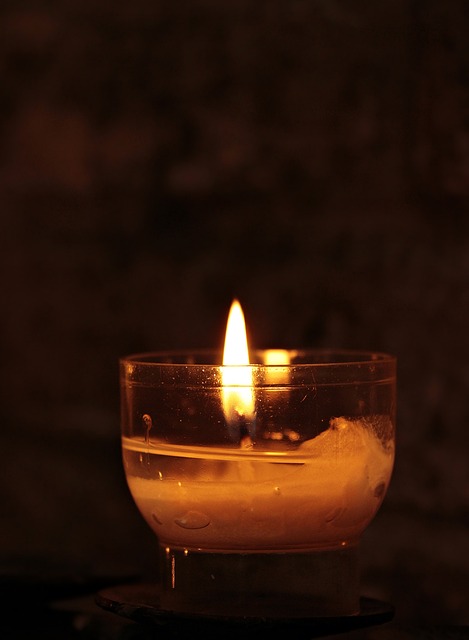Cremation is now a widely accepted end-of-life option that is handled with dignity and respect by professional cremation service providers, ensuring compliance with legal and ethical standards. The process involves careful preparation of the deceased, adherence to authorization protocols, and a controlled heating process in a crematory furnace at high temperatures, typically between 1,400 to 1,800 degrees Fahrenheit, resulting in ashes and bone fragments. Post-cremation, any remaining metal is removed, and the ashes are processed into an urn. Cremation services extend beyond the physical act, offering a range of ceremonial options, diverse urn selections including eco-friendly alternatives, and guidance for personalized farewells. These services also include digital memorialization through online platforms and aftercare support for grieving families with counseling and guidance. The entire process from authorization to final disposition usually takes five to seven days, though this can vary based on individual size and crematory efficiency. Cremation service providers are committed to providing compassionate care and meaningful memorial experiences during this sensitive time.
When contemplating cremation as a dignified end-of-life option, understanding the process is paramount. This article delves into the intricacies of cremation, from its inception to the myriad services available post-ceremony. We will explore each stage of the cremation process, including factors that influence the duration of this procedure, ensuring families are well-informed about what to expect. Whether you’re considering cremation services for a loved one or seeking clarity on the process, this comprehensive guide will illuminate every aspect, offering a respectful and insightful look into this end-of-life choice.
- Understanding the Cremation Process: An Overview
- The Cremation Procedure: Step-by-Step Breakdown
- Preparing for Cremation: Legal and Practical Considerations
- Time Frame: How Long Does the Cremation Process Take?
- Factors Affecting Cremation Duration
- After the Cremation: Memorial Options and Services Offered
Understanding the Cremation Process: An Overview

Cremation is a dignified and increasingly popular option for those considering end-of-life arrangements. The process begins with the family or responsible parties making arrangements with a cremation service provider. These professionals handle all legal and logistical aspects, ensuring the procedure adheres to both local regulations and ethical standards. The deceased is then prepared by trained staff, who follow specific protocols that include identifying the individual, obtaining necessary authorizations, and addressing any medical devices or artificial substances.
The actual cremation process typically involves placing the body in a crematory chamber, which is then heated to high temperatures for a duration ranging from one to three hours. The intense heat vaporizes all organic tissues, leaving behind only bone fragments, which are later processed into fine particles. Throughout this time, the trained operators monitor the process closely, ensuring that it is conducted both safely and respectfully. After cremation, the remaining ashes are carefully collected and placed in an urn, providing families with a tangible keepsake of their loved one. Cremation services often include additional options such as memorial services, urns, and even biodegradable urns for those who prefer environmentally friendly options. Understanding this process allows individuals to make informed decisions about cremation services that best suit their needs and preferences.
The Cremation Procedure: Step-by-Step Breakdown

The process of cremation is a dignified and widely chosen method of final disposition, carried out by professional cremation services. This procedure involves several steps that are carefully executed to honor the deceased and ensure the process is performed correctly and legally. Upon entering the care of a reputable cremation service, the body is prepared in accordance with state and local regulations, which may include removing any artificial limbs, medical devices, or other non-organic items. The deceased is then placed in a combustion chamber, commonly known as a crematory furnace, where the actual cremation process begins. At high temperatures, typically between 1,400 to 1,800 degrees Fahrenheit, the body is cremated, a process that usually takes two to three hours. This intense heat reduces the body’s tissues to their basic components, resulting in ashes and bone fragments. After the cremation is complete, any remaining metal (such as dental amalgam or implants) is carefully removed by trained personnel. The ashes are then processed into a fine consistency and placed in an urn, ready for memorialization or interment according to the family’s wishes. Throughout this entire process, cremation services ensure that all legal requirements and ethical guidelines are followed, providing families with a respectful and honorable farewell for their loved ones.
Preparing for Cremation: Legal and Practical Considerations

When contemplating cremation as a final disposition option, individuals and families must navigate both legal and practical considerations to ensure the process aligns with their wishes and local regulations. Cremation services providers play a pivotal role in guiding the bereaved through this journey by offering comprehensive guidance on the necessary steps. Legally, it’s imperative to understand the laws governing cremation in your jurisdiction. These laws dictate who can authorize cremation, the documentation required, and the time frame within which the process must be completed. Typically, a death certificate and a valid identification are prerequisites for legal cremation. Additionally, families must decide whether to have a memorial service, a funeral before cremation, or a gathering after the ashes are returned. Practical considerations extend beyond legality to include choosing a reputable crematory, understanding the costs involved, and planning for the final disposition of the remains. Cremation services range from simple direct cremations to more traditional ceremonies with a viewing or funeral before the cremation process. Each option carries its own set of logistical decisions that require thoughtful consideration. The decision-making process is not solely about honoring the deceased but also about providing comfort and closure for those left behind. Thus, it’s crucial to engage with established cremation services providers who can offer clarity and compassionate support throughout this delicate process.
Time Frame: How Long Does the Cremation Process Take?

When a loved one has passed and cremation is chosen as a means of memorialization, understanding the duration of the process can be an important aspect for families during this difficult time. The entire cremation process is typically completed within five to seven days after all necessary authorizations have been obtained. This timeline includes both the actual cremation procedure and any preliminary arrangements or post-cremation services that are desired.
The cremation itself generally takes between two to three hours, depending on the size of the body and the efficiency of the crematory equipment. The process begins with the deceased being placed in the cremation chamber, also known as the retort, where high heat is applied to reduce the body’s size and temperature until all organic tissues are consumed, leaving only bone fragments. Following this, a specialized processing machine reduces these bone fragments into their essential mineral components, which are then carefully handled and respectfully scattered or interred according to state regulations and the family’s wishes. Cremation services, encompassing the ceremony and the practical aspects of the process, are tailored to each family’s needs and can be as simple or elaborate as desired, often including a memorial service to honor the life of the deceased. It is essential for families to discuss their preferences with their chosen cremation provider to ensure that the service aligns with their expectations and timeframe.
Factors Affecting Cremation Duration

The duration of a cremation process can vary due to several factors, each influencing the time it takes from start to finish. These factors include the size and weight of the deceased, the efficiency of the cremation equipment, and the specific procedures followed by the crematorium. Typically, cremation services involve placing the deceased in a cremation chamber or furnace at high temperatures, which causes the body to decompose and the bones to be reduced to ashes. The heating element, often referred to as a retort, is crucial as it must reach and maintain a temperature of between 1400 to 1800 degrees Fahrenheit until all biological matter has been incinerated. Larger individuals require more time due to their greater mass, which absorbs and holds onto heat longer than smaller bodies. Additionally, modern cremation systems are designed to maximize efficiency, reducing the time needed for the process. The facilities themselves can also impact duration; state-of-the-art crematory units with advanced technology tend to complete the process more swiftly than older models. After the body is sufficiently cremated, the remaining bones are carefully removed from the chamber and processed into fine ashes. This entire process, from placing the body in the furnace to collecting the ashes, can take anywhere from two to three hours on average, though this can extend to six or more hours for larger individuals. It’s a meticulous and regulated procedure that requires adherence to both legal standards and ethical considerations to ensure respect and dignity for the deceased and their loved ones.
After the Cremation: Memorial Options and Services Offered

Following the cremation process, memorial options and services are available to honor the deceased’s memory in a meaningful way. Crematoriums often provide diverse memorial services that can be tailored to reflect the individual’s personality, beliefs, or cultural practices. These services may range from simple ceremonies to elaborate gatherings, with options for personalization such as music, readings, and tributes that celebrate the life lived. Additionally, many providers offer a variety of urns and keepsake items to commemorate the deceased, allowing families to keep a tangible remembrance. Cremation services also extend beyond the immediate event; they include permanent memorialization options such as plaques, monuments, or scattering ceremonies in significant locations. These post-cremation services ensure that the memory of the loved one remains a cherished part of the family’s history, offering a sense of closure and a way to remember and celebrate their life story.
In the realm of cremation services, there is a growing trend towards more personalized and flexible memorial options. Many service providers now offer the option to live-stream the service for those who cannot attend in person, ensuring that everyone who wishes to pay their respects can do so. Memorial websites and digital remembrance platforms are also becoming increasingly popular, allowing for the sharing of memories, photos, and videos. These digital keepsakes serve as a lasting tribute, providing comfort and a sense of connection with the departed. Moreover, aftercare services are available to support bereaved families during their grieving process, offering counseling and guidance through the complex emotional and legal stages following a loss. These comprehensive services underscore the sensitivity and care that cremation service providers bring to this delicate aspect of end-of-life arrangements.
When addressing the question of how long cremation takes, it’s clear that the process is a respectful and dignified end-of-life option, with the actual cremation duration typically ranging from one to three hours. This time frame can be influenced by factors such as the individual’s body size, the efficiency of the crematory equipment, and local regulations. The entire experience, including preparation, the cremation itself, and follow-up services like memorial options and cremation urn selection, is carefully managed by reputable cremation services to ensure a meaningful and personalized farewell. Understanding each step of the process—from legal and practical considerations to the cremation procedure proper—enables families to make informed decisions that honor their loved ones’ wishes. Cremation remains a compassionate and widely chosen alternative, reflecting diverse cultural practices and providing a fitting tribute to those who have passed.



